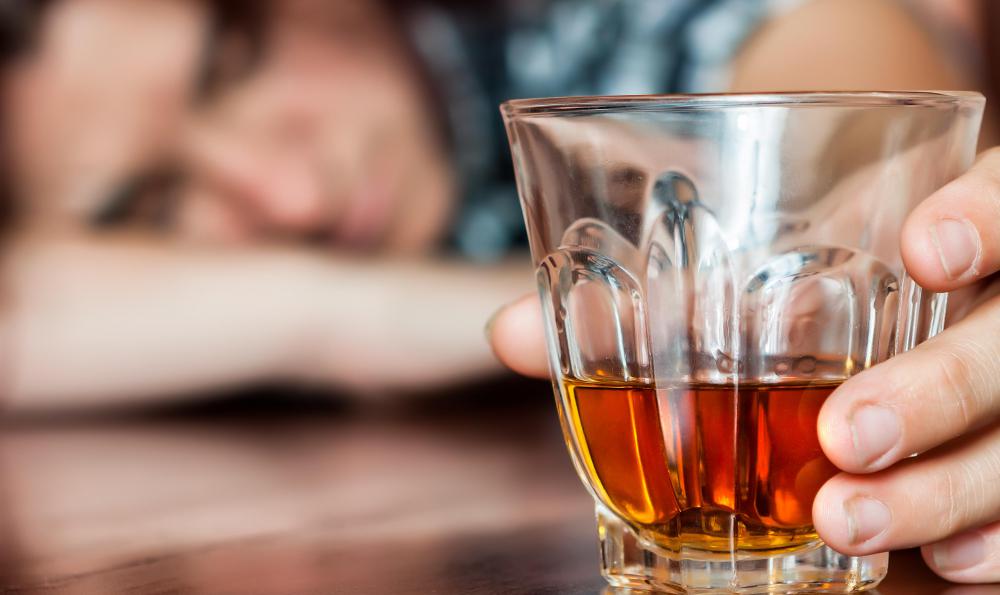At TheHealthBoard, we're committed to delivering accurate, trustworthy information. Our expert-authored content is rigorously fact-checked and sourced from credible authorities. Discover how we uphold the highest standards in providing you with reliable knowledge.
What Is the Connection between Alcohol and Mood Swings?
Alcohol is often thought to be a stimulant because of the sense of euphoria a person feels after one or two drinks. Nothing could be further from the truth, however. Alcohol is in fact a powerful depressant that causes chemical changes in one's central nervous system and brain. A direct relationship exists not only between alcohol and mood swings, but also between alcohol and anxiety, depression, memory, concentration and judgment.
The human brain is composed of about one trillion nerve cells known as neurons. Neurons communicate with one another via electric and chemical neurotransmitters, allowing messages to be sent throughout the body. The messages serve to maintain one's cognition, heartbeat, lung functions, mood and countless other processes. The relationship between alcohol and mood swings comes into play if the transmission of these critical signals is slowed, blocked or interrupted. Alcohol hampers the ability of the neurons to direct bodily systems at the correct rate, and it negatively affects an individual's cerebellum, cerebral cortex and limbic system.

The latter two areas largely regulate memory, emotion, behavior, judgment and recognition of social cues. Alcohol's role in mood swings is the result of a direct cause-and-effect scenario in which the intoxicating substance slows or stops messages to the necessary portions of the brain. Consumption of too much alcohol not only causes one to forget names, dates or figures, it also causes the cerebral cortex and limbic system to forget how to react and behave. This loss of one's cognitive ability and emotional control might be temporary, but in the case of long-term alcohol abuse, it can sometimes be permanent.

A link between alcohol and mood swings is further exemplified by liquor's influence on endorphins and serotonin. The former is a substance in the brain that aids relaxation, and the latter is a neurotransmitter that plays a major role in controlling emotional peaks and valleys. The interruption of neurotransmissions caused by alcohol forces the brain to function without feedback from all its parts. It attempts to compensate for this "blind" state by sending a signal that releases excess amounts of serotonin and endorphins. The body and mind are confused by this massive release, leading a person who is under the influence of alcohol to sometimes seem ecstatic in one instant and violently angry in the next.

Researchers believe that the connection between alcohol and mood swings is partially dependent on the frequency that one drinks. The amount of alcohol consumed on a regular basis is another factor, as is one's genetic make-up. Alcoholism and alcohol intolerance are inherited traits, and if abuse is identified early, some of the damage inflicted on the brain can often be reversed.
AS FEATURED ON:
AS FEATURED ON:
















Discussion Comments
@ZipLine-- Alcohol has more side effects than most of us realize. This is why addiction to alcohol occurs. If someone drinks regularly, the brain adjusts neurotransmitters, receptors and chemicals to cope with the effects of alcohol. These changes that lead to mood swings among other things cause the brain to work differently altogether if alcohol use becomes frequent. This is why alcoholics experience so many withdrawal symptoms when they do not drink.
I had no idea that alcohol affects the brain in so many different ways. I knew alcohol causes mood swings but I didn't realize that it alters brain function so much and that it can permanently change the brain.
I think that people have the impression that alcohol is a stimulant because it's a relaxant and it removes inhibitions. So people may act very differently under the influence of alcohol. Some people become sleepy and tired after too many drinks while others may become active.
This is why I stopped drinking actually. I used to have severe mood swings when I consumed alcohol, so much that I couldn't recognize myself. I was like a different person, doing things I usually don't do. I did not like being that way so I stopped drinking.
Post your comments